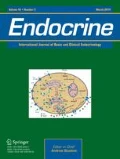Vera-Lastra et al. [1] and Zettinig et al. [2] recently reported four cases of Graves’ disease that developed after severe acute respiratory syndrome coronavirus 2 (SARS-Cov-2) BNT162b mRNA vaccination (Pfizer-BioNTech). I herein report a case with worsened Graves’ hyperthyroidism after heterologous prime-boost immunization with inactivated and adenovirus-vectored SARS-CoV-2 vaccine.
A 30-year-old female physician was diagnosed with Graves’ disease in October 2018 with a TSH receptor antibody (TRAb) level at 36.15 IU/L (N, 0–1.75). Her father, mother, and brother also had a history of Graves’ disease. Hyperthyroidism was adequately controlled by methimazole 2.5 mg per day. The summary of thyroid function tests (TFTs) was shown in Fig. 1. She had been vaccinated with two doses of inactivated whole-virus SARS-CoV-2 vaccine CoronaVac (Sinovac Biotech, China) on 7 April and 26 April 2021. Due to the B.1.617.2 (delta) variant pandemic in Thailand, she received a booster vaccine with a replication-deficient chimpanzee adenovirus-vectored vaccine ChAdOx1 nCoV-19 (AZD1222, Oxford-AstraZeneca) on 19 July 2021. Four days after vaccination, she noticed palpitations and needed propranolol to control her symptoms. She lost weight of 2 kg despite an increased appetite. On 29 July 2021, she increased a methimazole dose from 2.5 to 5 mg daily by herself. Her thyrotoxic symptoms were improved. TFTs at 1 month after an adjusted methimazole dose remained T3-toxicosis with elevated TRAb (Fig. 1). At the 28th day after the dose of ChAdOx1 nCoV-19 vaccine, serum SARS-Cov-2 anti-RBD IgG level was 1991.8 BAU/mL.
The COVID-19 pandemic is now responsible for one of the most challenging and deadliest pandemics. Despite the social distance, mask-wearing, and lockdown, the infected cases remain growing. A mass vaccination campaign is essential to control the COVID-19 pandemic. The mRNA vaccines have shown high levels of efficacy but can activate several proinflammatory pathways that may trigger autoimmune diseases. Heterologous prime-boost vaccination has been recommended as a strategy against emerging SAR-CoV-2 variants. Mixing two different vaccine platforms elicits a stronger immune response than a single vaccine regimen. Heterologous prime-boost with two doses of inactivated vaccine followed by adenovirus-vectored vaccine improves humoral and cellular responses in mice [3], but no human data have been published in a peer-reviewed journal. Currently, an association between Graves’ disease and the high efficacy SARS-CoV-2 vaccine is still unclear. It is possibly due to an autoimmune/inflammatory syndrome induced by adjuvants (ASIA) [1]. Physicians should raise awareness regarding the potential for Graves’ disease as an adverse effect in order to provoke more observations and promote better understanding. However, vaccine hesitancy should be avoided because Graves’ disease is not difficult to treat and the benefit of vaccine protection against COVID-19 is far more significant.
References
O. Vera-Lastra, A. Ordinola Navarro, M.P. Cruz Domiguez, G. Medina, T.I. Sanchez Valadez, L.J. Jara, Two Cases of Graves’ Disease Following SARS-CoV-2 Vaccination: an autoimmune/inflammatory syndrome induced by adjuvants. Thyroid (2021). https://doi.org/10.1089/thy.2021.0142.
G. Zettinig, M. Krebs, Two further cases of Graves’ disease following SARS-Cov-2 vaccination. J. Endocrinol. Invest. (2021). https://doi.org/10.1007/s40618-021-01650-0.
J. Zhang, Q. He, C. An, Q. Mao, F. Gao, L. Bian, X. Wu, Q. Wang, P. Liu, L. Song, Y. Huo, S. Liu, X. Yan, J. Yang, B. Cui, C. Li, J. Wang, Z. Liang, M. Xu, Boosting with heterologous vaccines effectively improves protective immune responses of the inactivated SARS-CoV-2 vaccine. Emerg. Microbes Infect. 10(1), 1598–1608 (2021). https://doi.org/10.1080/22221751.2021.1957401.
Author information
Authors and Affiliations
Corresponding author
Ethics declarations
Conflict of interest
The author declares no competing interests.
Ethical approval
Written consent was obtained from the patient. This case report was approved by the Human Research Ethics Committee, Faculty of Medicine Ramathibodi Hospital, Mahidol University.
Additional information
Publisher’s note Springer Nature remains neutral with regard to jurisdictional claims in published maps and institutional affiliations.
Rights and permissions
About this article
Cite this article
Sriphrapradang, C. Aggravation of hyperthyroidism after heterologous prime-boost immunization with inactivated and adenovirus-vectored SARS-CoV-2 vaccine in a patient with Graves’ disease. Endocrine 74, 226–227 (2021). https://doi.org/10.1007/s12020-021-02879-8
Received:
Accepted:
Published:
Issue Date:
DOI: https://doi.org/10.1007/s12020-021-02879-8


